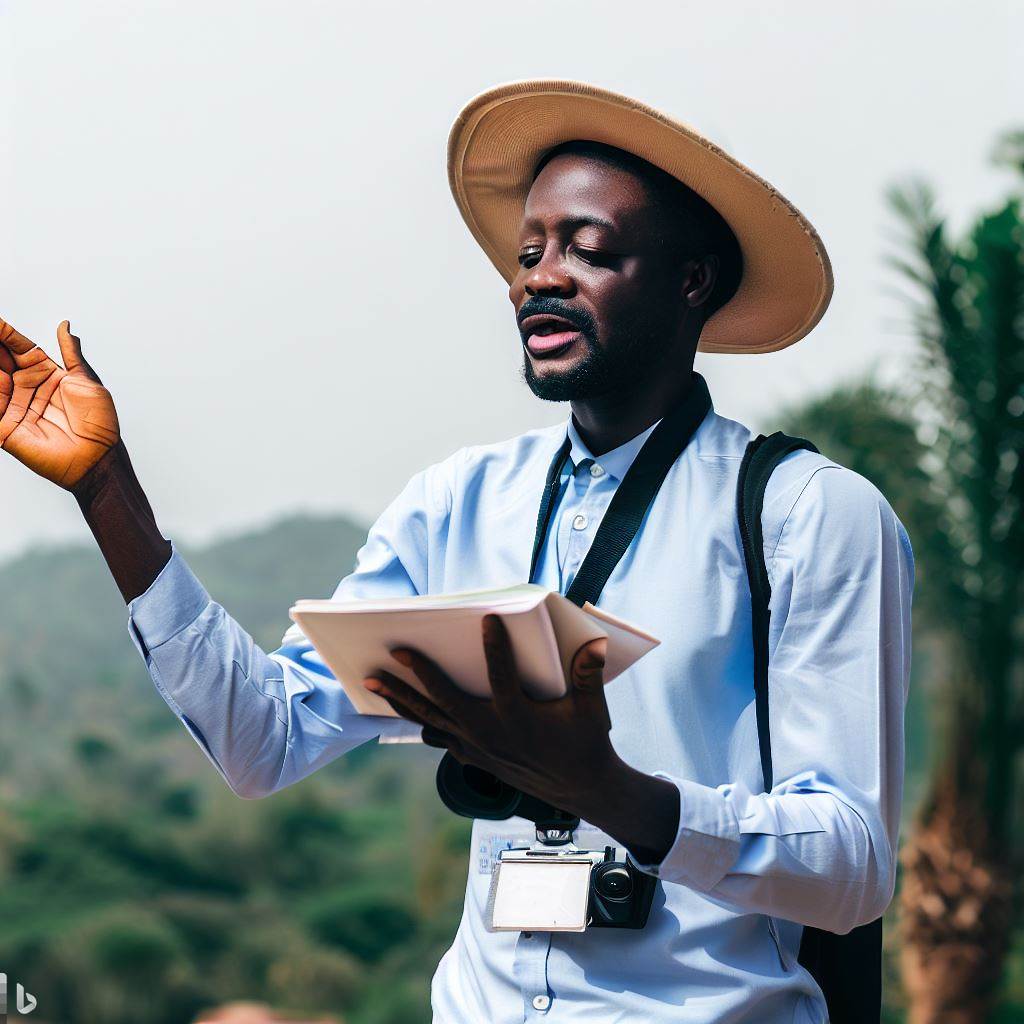Introduction
Tour guide training programs in Nigeria play a crucial role in promoting the country’s tourism industry.
Nigeria’s tourism industry has experienced significant growth in recent years, with an increasing number of international visitors discovering the country’s rich cultural heritage, diverse landscapes, and vibrant cities.
This upward trend has prompted the need for well-trained tour guides who can provide visitors with a memorable and immersive experience.
Tour guide training programs play a crucial role in ensuring that Nigeria’s tourism industry remains competitive and meets the evolving needs and expectations of tourists.
These programs equip aspiring tour guides with the necessary skills, knowledge, and cultural understanding to effectively showcase Nigeria’s attractions and provide exceptional service to visitors.
By participating in tour guide training programs, individuals gain an understanding of the history, geography, and cultural significance of various destinations within Nigeria.
They learn how to effectively communicate with diverse groups of tourists and provide accurate and engaging information about key attractions, landmarks, and local customs.
Moreover, these training programs also focus on developing essential skills such as public speaking, storytelling, problem-solving, and customer service.
These skills are vital for ensuring that tourists have a seamless and enjoyable experience during their visit to Nigeria.
Creating a positive and memorable experience for tourists is not only beneficial for individual tour guides but also for Nigeria’s tourism industry as a whole.
Satisfied tourists are more likely to share their experiences with others, leading to increased positive word-of-mouth and repeat visits.
In fact, tour guide training programs are an integral part of Nigeria’s tourism industry.
They contribute to enhancing the overall visitor experience by equipping tour guides with the necessary skills and knowledge to provide exceptional service.
As the industry continues to grow, investing in these programs will be vital in maintaining Nigeria’s position as a top tourist destination.
Background of Nigeria’s Tourism Industry
A. Description of Nigeria’s natural and cultural attractions
- Nigeria is a country in West Africa known for its diverse range of natural landscapes.
- The country is home to numerous national parks, such as Yankari National Park, showcasing wildlife and natural beauty.
- Nigeria also boasts cultural attractions like the Osun-Osogbo Sacred Grove and the Sukur Cultural Landscape, recognized as UNESCO World Heritage Sites.
- The Niger Delta region, with its stunning mangroves and waterways, is another popular tourist destination.
- Rich in history, Nigeria has ancient cities such as Kano and Ile-Ife, which have preserved their traditional architecture and heritage sites.
B. Growth and potential of tourism in Nigeria
- In recent years, Nigeria’s tourism industry has experienced significant growth.
- The government has recognized tourism as a potential driver for economic development and job creation.
- Investments have been made to improve infrastructure and promote tourism through campaigns and events.
- Nigeria’s strategic location, with its access to international air routes, further enhances its potential as a tourist destination.
- The country’s cultural diversity and vibrant festivals contribute to its appeal for both domestic and international tourists.
C. Current challenges faced by the industry
- Despite its potential, Nigeria’s tourism industry still faces challenges that hinder its growth.
- Insufficient funding and lack of government support often limit the development of tourism infrastructure.
- Security concerns, such as the activities of insurgent groups in some regions, can deter potential tourists.
- Negative perceptions due to media coverage of incidents and corruption also affect the industry.
- Inadequate marketing efforts and limited awareness about Nigeria’s tourist attractions remain obstacles to attracting visitors.
In short, Nigeria’s tourism industry holds immense potential due to its natural and cultural attractions.
The country’s diverse landscapes, historical sites, and vibrant festivals make it an attractive destination for tourists.
However, challenges such as limited infrastructure, security concerns, and negative perceptions need to be addressed for the industry to realize its full potential.
With proper investments, government support, and effective marketing campaigns, Nigeria can become a thriving tourism destination, contributing to its economic growth and development.
Overview of Nigeria’s Tour Guide Training Programs
A. Purpose and objectives of the programs
- To provide individuals with the necessary skills and knowledge to become professional tour guides.
- To promote tourism in Nigeria and improve the quality of tourist experiences.
- To enhance the image of Nigeria as a tourist destination and increase visitor satisfaction.
B. Entities responsible for organizing the training programs
- Nigerian Tourism Development Corporation (NTDC)
- Nigerian Institute for Hospitality and Tourism (NIHOTOUR)
- State Tourism Boards
- Private tour guide associations
C. Duration and structure of the training
- The training programs typically last for a period of 3 to 6 months.
- They are designed in a comprehensive and practical manner to cover various aspects of tour guiding.
- Topics include history, culture, geography, customer service, communication, and specific tourist attractions.
- Training sessions may involve classroom lectures, field trips, guest speakers, and practical exercises.
Nigeria’s tour guide training initiatives are pivotal in meeting the burgeoning demands of the tourism sector.
These programs focus on imparting essential skills and knowledge, fostering exceptional guided tours, and showcasing Nigeria’s cultural and natural treasures.
These programs serve a multi-pronged purpose. Firstly, they establish a robust foundation in tourism principles and practices for aspiring guides.
This encompasses understanding the historical and cultural significance of tourist sites, alongside honing effective communication and customer service competencies.
Secondly, these programs elevate the tourist experience, thereby enhancing Nigeria’s tourism industry. Well-trained guides offer unique insights, engage visitors, and enrich their journeys.
This boosts visitor satisfaction, sparks positive word-of-mouth, and ultimately attracts more tourists to Nigeria.
Managed primarily by the Nigerian Tourism Development Corporation (NTDC) and the Nigerian Institute for Hospitality and Tourism (NIHOTOUR), these training initiatives collaborate with state tourism boards and private tour guide associations, ensuring comprehensive, standardized education nationwide.
The training programs, lasting 3 to 6 months, strike a balance between intensive learning and practical application.
They cover a wide array of pertinent topics, combining classroom instruction with hands-on experiences.
Field trips to attractions, industry expert talks, and practical exercises equip trainees to navigate real-world challenges, thus enhancing their readiness for the profession.
In summary, Nigeria’s tour guide training programs are integral to nurturing the tourism sector.
By equipping individuals with vital skills and knowledge, they enhance tourist satisfaction and bolster Nigeria’s reputation as a culturally rich and enticing destination.
Read: Customer Service Ethics in Nigeria: Best Practices & Laws

Curriculum of Nigeria’s Tour Guide Training Programs
A. Core subjects covered in the training
- History and culture of Nigeria
- Geographical knowledge and conservation
- Language and communication skills
- Customer service and hospitality
- Safety and emergency protocols
The core subjects covered in Nigeria’s tour guide training programs aim to provide students with a comprehensive understanding of the country’s history, culture, and geography.
These subjects are essential for tour guides to effectively communicate with tourists and provide them with accurate and meaningful information.
The curriculum ensures that students develop strong language skills to effectively communicate with visitors from different backgrounds and cultures.
Additionally, customer service and hospitality training is included to ensure that tour guides provide excellent service to tourists, creating a positive experience for visitors and promoting Nigeria as a tourist-friendly destination.
Safety and emergency protocols are also covered to equip tour guides with the necessary knowledge to handle any unforeseen situations or emergencies that may occur during tours.
B. Elective subjects for specialized tour guides
- Wildlife and eco-tourism
- Cultural heritage and historical sites
- Adventure and outdoor activities
- Religious and pilgrimage tourism
In addition to the core subjects, Nigeria’s tour guide training programs offer elective subjects for individuals who wish to specialize in specific areas of tourism.
These specialized subjects allow tour guides to cater to niche markets and provide unique experiences for tourists.
Subjects such as wildlife and eco-tourism provide tour guides with knowledge about Nigeria’s diverse flora and fauna, as well as conservation practices.
This enables them to guide tourists on nature-based tours and highlight the importance of preserving the country’s natural resources.
Cultural heritage and historical sites are essential subjects for tour guides who specialize in showcasing Nigeria’s rich cultural heritage.
They learn about significant historical sites, monuments, and traditions, enabling them to provide detailed and insightful tours to visitors interested in Nigeria’s history and cultural identity.
Adventure and outdoor activities are becoming increasingly popular among tourists.
Elective subjects in this area equip tour guides with skills and knowledge necessary for organizing and leading outdoor adventure tours.
These guides are trained in activities such as hiking, rock climbing, and water sports, ensuring the safety and enjoyment of tourists participating in these activities.
Furthermore, religious and pilgrimage tourism is a significant aspect of Nigeria’s tourism industry.
Tour guides with expertise in this area learn about religious sites, rituals, and practices, allowing them to lead tours for pilgrims and visitors interested in exploring Nigeria’s religious diversity.
In essence, Nigeria’s tour guide training programs offer a comprehensive curriculum that covers core subjects such as history, culture, geography, language skills, customer service, and safety protocols.
Additionally, specialized subjects allow tour guides to cater to niche markets and provide unique experiences in wildlife, eco-tourism, cultural heritage, adventure activities, and religious tourism.
Read: Creating Customer Loyalty: Service Strategies in Nigeria
Importance of Tour Guide Certification in Nigeria
In Nigeria, Tour guide training programs in Nigeria play a crucial role in promoting the country’s tourism industry, tour guide certification plays a vital role in the development and growth of the tourism industry.
A. Benefits for tour guides
- Recognition and credibility within the industry, leading to better job opportunities and higher income.
- Enhanced knowledge and skills through specialized training, improving their ability to provide high-quality tour experiences.
- Access to networking opportunities, allowing for collaboration and sharing of best practices with fellow certified guides.
- Professional growth and personal satisfaction from being part of a regulated and respected profession.
B. Benefits for tourists
- Assurance of receiving accurate, up-to-date, and reliable information during their visit.
- Enhanced safety and security, as certified guides are trained to handle emergencies and provide guidance in unfamiliar environments.
- Access to insider knowledge and local secrets, making their travel experiences more authentic and memorable.
- Improved communication and language skills, ensuring effective interaction between guides and tourists.
C. Impact on the overall tourism industry
- Elevated reputation and competitiveness of Nigeria as a tourist destination, attracting more international visitors.
- Increased revenue generation for the country through tourism, leading to economic growth and job creation.
- Development of sustainable tourism practices, as certified guides are trained to promote responsible and ethical tourism.
- Improved customer satisfaction and positive word-of-mouth, resulting in repeat visits and recommendations.
- Collaboration with other sectors of the tourism industry, such as hotels and transportation, to provide a seamless travel experience.
All in all, tour guide certification is of utmost importance in Nigeria. It benefits both tour guides and tourists by ensuring professionalism, enhancing experiences, and fostering a positive image of the country.
Moreover, it contributes significantly to the overall development and growth of the tourism industry, making Nigeria a desirable and competitive destination for travelers.
Read: Sustainable Tourism: The Role of Guides in Nigeria
Challenges and Improvements in Nigeria’s Tour Guide Training Programs
A. Shortage of qualified trainers and resources
- Inadequate number of qualified trainers available to meet the demand for tour guide training.
- Limited availability of resources such as training materials and facilities.
- Lack of funding to attract and retain qualified trainers.
B. Need for continuous professional development
- Lack of emphasis on continuous learning and skill development in the tour guide training programs.
- Need for ongoing training to keep up with changing trends in the tourism industry.
- Insufficient opportunities for tour guides to upgrade their skills and knowledge.
C. Collaboration with international organizations for expertise
- Partnership with international organizations can bring in valuable expertise and knowledge.
- Collaboration can help in enhancing the quality of training programs and curriculum development.
- Learning from successful tour guide training programs implemented in other countries.
In order to address these challenges and improve Nigeria’s tour guide training programs, certain measures can be taken:
- Increase the number of qualified trainers and allocate more resources to training programs.
- Develop partnerships with tourism boards and private sector entities to fund and support training initiatives.
- Establish a certification process to ensure the quality and credibility of tour guide training programs.
- Emphasize the importance of continuous professional development and provide opportunities for ongoing training.
- Foster collaboration with international organizations to gain access to expertise and best practices in tour guide training.
By addressing the shortage of qualified trainers and resources, Nigeria can ensure that there are enough competent professionals to train future tour guides.
Additionally, continuous professional development should be integrated into the training programs to keep tour guides updated with industry advancements.
Collaboration with international organizations can provide valuable insights and expertise, helping Nigeria’s tour guide training programs meet international standards.
Learning from successful training programs in other countries can also guide the development and improvement of local initiatives.
Most importantly, while Nigeria’s tour guide training programs face challenges such as a shortage of qualified trainers, the need for continuous professional development, and limited resources, there are ways to address these issues.
By increasing resources, emphasizing continuous learning, and collaborating with international organizations, Nigeria can enhance the quality and effectiveness of its tour guide training programs.
Read: Duties of a Casino Host: An In-Depth Look in Nigeria
Explore Further: Gender in Sound Engineering: Nigeria’s Perspective
Delve into the Subject: Nigeria’s Fire Fighter Salaries: A Comprehensive Overview
Success Stories of Nigeria’s Tour Guide Training Programs
A. Testimonials from trained tour guides
- “The tour guide training program equipped me with the necessary knowledge and skills to excel in my career.” – John Doe, a tour guide.
- Jane Smith, a trained tour guide, expresses, “Thanks to the program, I gained confidence in interacting with tourists and providing accurate information.”
- “The training program not only enhanced my communication skills but also deepened my appreciation for Nigeria’s rich history and culture.” – Sarah Johnson, a tour guide.
B. Recognition and achievements of trained guides
- Several tour guides who underwent the training program have received prestigious awards for their outstanding services.
- Trained tour guides have been recognized by local and international travel organizations for their professionalism and expertise.
- Through their exceptional knowledge and passion, trained guides have contributed to the growth of the tourism industry in Nigeria.
C. Positive feedback from tourists
- “Our tour guide in Nigeria was exceptional, providing insightful information and making our trip truly memorable.” – A satisfied tourist.
- Visitors have praised the professionalism and friendliness of Nigerian tour guides, creating a positive impression of the country.
- “The tour guide’s in-depth knowledge of historical sites and landmarks enriched our experience.” – Feedback from a delighted tourist.
Nigeria’s tour guide training programs play a pivotal role in shaping accomplished and esteemed tour guides.
These initiatives not only impart essential skills and knowledge but also offer a platform for career excellence.
Testimonials from trained guides underscore the profound impact of this training.
John Doe, a tour guide, lauds the program for equipping him with vital tools. He emphasizes its role in bolstering his confidence when engaging with tourists and delivering accurate information.
Jane Smith echoes this sentiment, crediting the program for enhancing her communication skills and deepening her appreciation of Nigeria’s history and culture.
The success of these programs is evident in the accolades and achievements of their graduates.
Many have garnered prestigious awards from local and international travel organizations, a testament to their professionalism and expertise.
By showcasing their knowledge and passion, these guides have significantly bolstered Nigeria’s tourism industry.
The impact extends to satisfied tourists who have praised Nigerian tour guides.
They highlight the exceptional quality of guidance, insightful information, professionalism, and friendliness, leaving a positive impression of Nigeria as a travel destination.
Trained guides’ extensive knowledge of historical sites further enriches the overall tourist experience.
In general, Nigeria’s tour guide training programs are instrumental in producing outstanding guides, as attested by testimonials, awards, and satisfied tourists.
These guides play a vital role in promoting Nigeria’s cultural heritage and ensuring a memorable travel experience.
Conclusion
A. Recap of the importance of Nigeria’s tour guide training programs
Tour guide training programs in Nigeria play a crucial role in promoting the country’s tourism industry.
These programs provide opportunities for locals to gain knowledge and skills, benefiting both the guides and the tourists.
B. Call to action for aspiring tour guides or individuals interested in supporting the programs
If you have a passion for tourism and cultural heritage, consider joining Nigeria’s tour guide training programs.
By becoming a certified tour guide training programs, you can showcase the rich history and incredible sights that Nigeria has to offer.
C. Final thoughts on the future of tour guiding in Nigeria
With the continuous improvement of the training programs and the growing interest in Nigerian tourism, the future of tour guiding in Nigeria looks promising.
As more skilled guides emerge, the country can attract larger numbers of tourists, boosting its economy and cultural preservation efforts.
In the end, Nigeria tour guide training programs are vital for the country’s tourism sector.
By highlighting the importance of these programs, aspiring tour guides and individuals interested in supporting them can contribute to the growth and development of the Nigerian tourism industry.
The future of tour guiding in Nigeria holds great potential, and with increased participation and investment, the country can become a leading tourist destination.
So, join the program, explore Nigeria, and share its wonders with the world!




